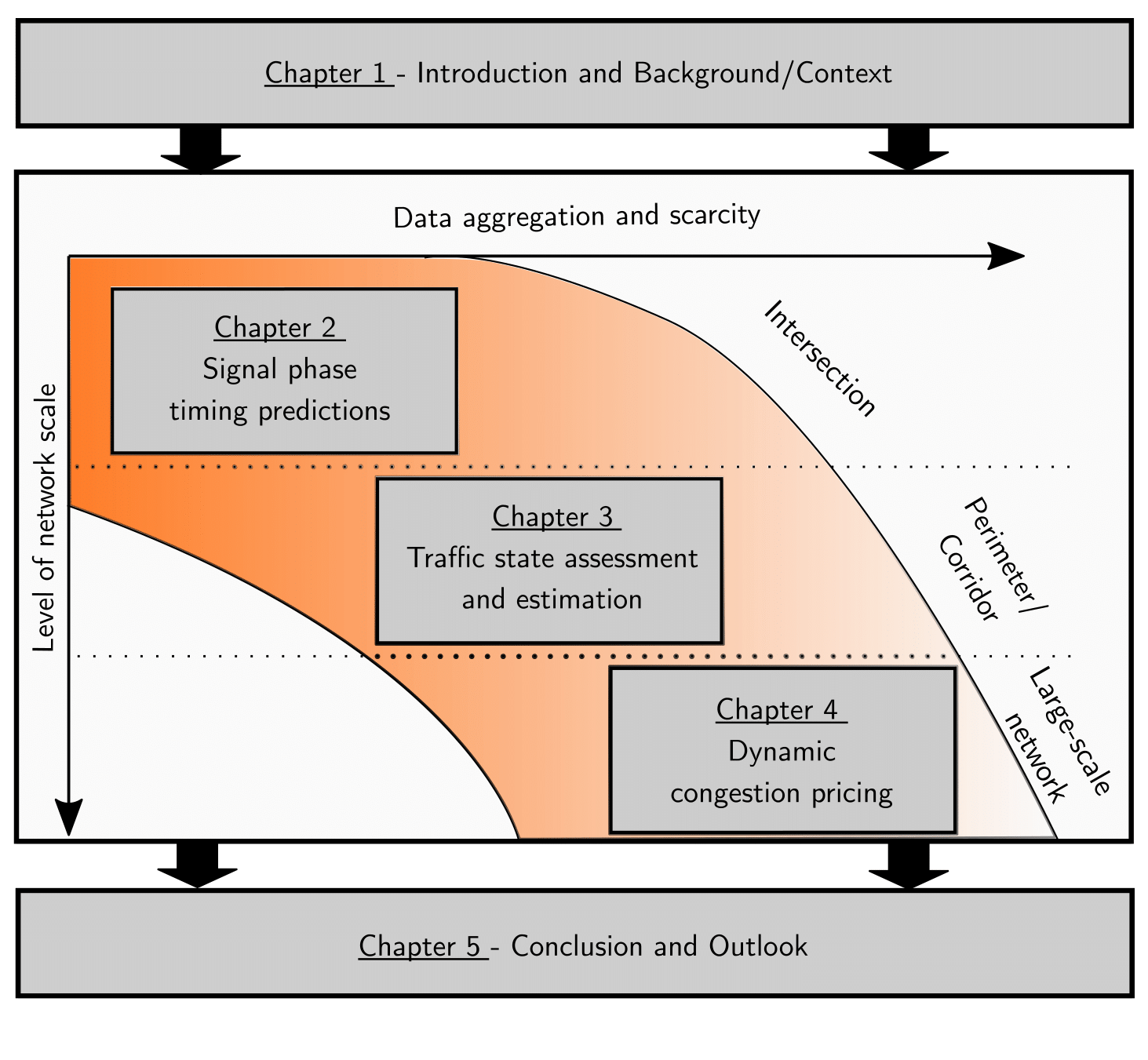Alexander Genser
Machine learning for traffic management in urban transportation networks
PhD thesis investigating three traffic engineering research problems.
Problem description
Thesis:
Urban transport infrastructure is under increasing pressure as more and more people want to live in cities and surrounding metropolitan areas. This development leads to increasing congestion, which deteriorates the level of service of networks and results in externalities. Targeted traffic management is an important component in counteracting these effects and meeting the mobility challenges in urban areas. Since transportation networks are complex systems, machine learning has gained importance in transportation research. This dissertation aims to solve traffic engineering problems by exploring the potential of machine learning in the field of traffic management. Approaches for challenges at three levels in a network are proposed: at an intersection, a perimeter/corridor, and at a large-scale network level.
The first part of this thesis focuses on signal phase timing prediction at an isolated urban intersection. A framework is developed for multi-modal intersection systems to predict the duration of the next signal phase of a fully actuated signal control system. Based on an empirical data set from the city of Zurich, physically informed feature engineering is performed to evaluate state-of-the-art machine learning techniques (linear regression, random forest, long short-term memory neural network). We find that applying machine learning with feature engineering based on traffic flow theory is a promising tool for predicting signal phase timings when the traffic signal control system is proprietary.
The second part focuses on inferring traffic conditions in an urban area with novel sensor technologies. Measurements of traffic flow and travel times are obtained from various sensors and compared to a ground truth data set. In this first part of the study, we find that thermal cameras and a license plate algorithm can accurately determine traffic flow. However, the analysis of travel time measurements shows that the WiFi module of the thermal cameras and Google distance matrix data cannot accurately replicate the current traffic conditions in the area. Moreover, we propose a simple but efficient linear regression model that performs data fusion of moving sensors (a vehicle fleet fraction of 5%), static loop detectors, and traffic signal data. We find that (a) 5% of ground truth is insufficient to represent travel time for a given route, and (b) data fusion with a simple linear model can significantly reduce travel time prediction error.
Finally, the third part of this thesis presents a novel approach to traffic management with dynamic congestion pricing. We focus on developing a dynamic pricing system for multi-regional urban networks with machine learning. For this purpose, the optimal routing decisions of the system are derived first by solving a linearized optimization problem. Based on the optimal solution and the user's route choice, neural network models that capture the user's travel behavior are trained. Consequently, these models can be used to determine the dynamic price functions. We show that a linear solution of the model's system optimum is accurate and can be computed in real-time. We also find that applying the dynamic price functions significantly reduces the total time spent and the total distance traveled.
The research presented in this thesis has applications for research and practice. First, sophisticated feature engineering and the application of machine learning improve (a) prediction of signal phase timings, (b) traffic state estimation, and (c) traffic conditions by applying dynamic pricing based on users' (optimal) travel behavior. Second, although data availability continues to increase, appropriate data processing and the ability to deal with aggregation and scarcity are of great importance depending on the network's level of detail. Third, the study results show that data-driven traffic management enables models to capture complex and highly non-linear traffic dynamics, which is of great importance to provide efficient and sustainable solutions in the future

References
[1] Genser, A., “Machine learning for traffic management in urban transportation networks,” Doctoral Thesis, ETH Zurich, Zurich.